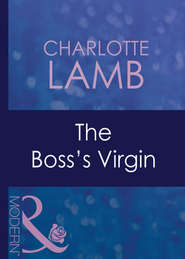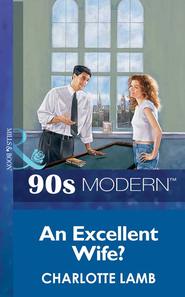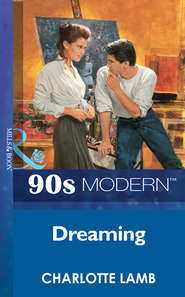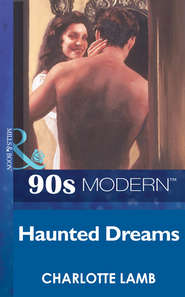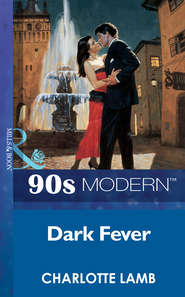По всем вопросам обращайтесь на: info@litportal.ru
(©) 2003-2025.
✖
Dark Fate
Автор
Год написания книги
2018
Настройки чтения
Размер шрифта
Высота строк
Поля
Domenico watched her, frowning. ‘Very well,’ he clipped out. ‘Ten-thirty? How much longer are you going to be in Venice?’
‘Another two days.’ She looked over her shoulder, hearing hurried footsteps approaching, recognising them. Jamie was coming to look for her. ‘I’ve got to go—I’ll see you at Florian’s at ten-thirty.’
She almost ran, praying that Domenico would not follow her. She and Jamie collided just inside the next room.
‘Oh, there you are!’ he said. ‘I was coming to look for you. What on earth have you been doing? Your tooth isn’t playing up again, is it?’
‘No, I was looking at the pictures, daydreaming.’ She tensed as Domenico strolled past them; she felt his lightning glance as he skimmed a look over Jamie. Saskia couldn’t breathe. What if he stopped and said something? She was terrified he would; she felt his anger like a physical blow, brooding, heavy with threat; but he walked away without a word and vanished towards the exit.
Weak at the knees, Saskia said to Jamie, ‘I want to get out of here, I’ve seen enough paintings to last me for a year.’
He laughed. ‘I know how you feel. My calf muscles ache—all this walking and standing about looking at paintings is getting a bit much. Why don’t we sneak off and have a coffee and sit at a café table out in the sun for half an hour, then take a stroll to the trattoria, to meet the rest of them for lunch?’
‘We ought to tell them we’re going, or they’ll be anxious about us.’
‘OK, make your way out of here and wait for me, while I run and tell them what we’re doing.’
Saskia wandered out into the sunshine. She looked around warily, but Domenico wasn’t in sight, and a few moments later Jamie ran out of the Accademia. They made for a café they had visited before, bought postcards and sat out in the sun, writing messages for friends back in England. Jamie sent one to his parents, another to his sister. Saskia had no family now; her mother had died three years ago, her father some time before that, and she had been an only child. Her closest relative was an aunt in Scotland but they had been out of touch for years. Saskia sent cards to the others working at the garden centre, a friend she played squash with once a week, a struggling young actress who lived in the flat next to hers.
At twelve-thirty they met the others in the trattoria, on a pleasant, sunny side canal leading into the Grand Canal eventually. The meal had been arranged in advance by the tour company. She suspected it was the same one every tour was offered here, but it was very good. They began with brodetto, a local fish soup which was cooked all together but served separately yet at the same time; first the broth itself, made with tomato and garlic, in one dish, and in another the fish, clams and squid which had been cooked in the liquid. Along the centre of the table the waiter put down wicker baskets of thick-sliced, golden-crusted Italian bread. Everyone enjoyed this first course, and it was followed by a selection of huge pizzas, from which they could cut themselves whatever they liked: the toppings varied, from simple cheese and tomato with onion, to seafood or chunks of local spicy sausage and garlic. For dessert they were offered ice-cream.
Saskia skipped dessert and just had strong black espresso coffee made in a gleaming chrome machine on the counter of the trattoria.
After lunch the guide told them they could have the rest of the afternoon free. Jamie fanned himself with his straw hat, yawning widely, and decided that what he needed was a siesta in his hotel room.
‘I shall do some shopping,’ Saskia said.
‘Well, be careful; don’t talk to strange men!’
She said wryly, ‘I won’t.’ She was always far too cautious to talk to strange men, and today she didn’t want to talk to anyone, even Jamie. She needed time alone, to think. ‘See you later, Jamie; enjoy your siesta,’ she said.
She walked away slowly as if to make for one of the main shopping areas of Venice, but once she was out of sight she doubled back, to wander along the quiet less-used canals, over bridges, through squares, watching the afternoon sun glinting on the ever-present water which made this city so magical. Sunlight gleamed everywhere, on the worn stone of ancient palaces, on geraniums on ironwork balconies, on washing hanging between houses high above alleys, above the narrow canals. She heard the dying echoes of voices along the water, from the backs of crumbling houses, the sound of children laughing, water rippling, women gossiping on their doorsteps, pigeons flapping in the sunny air.
It was a peaceful afternoon, yet she continually had the feeling she was being watched or followed, and kept pausing to look back, her nerves prickling.
There was never anyone there, except Venetians busy about their own lives, shopping, talking, unloading boats on to a quayside, washing windows, watering flowers. None of them ever looked her way.
Saskia walked on each time, trying to shake off her jumpiness, intent on absorbing Venice through every pore. She felt she was learning more about the city this way than in all the sightseeing their guide had been getting them to do.
She got back to the hotel eventually at about five when the sun was beginning to go down and the spring afternoon had cooled.
She felt as if she had been far away, her nerves were quiet, her mind tranquil, but as she crossed the marble floor towards the reception desk she stopped in shock, hearing a voice from a salon leading off the foyer.
Domenico!
What was he doing here? He knew she didn’t want anyone on the tour to know about their old relationship; he had agreed to wait until tomorrow to talk, at Florian’s. So why was he here now?
She slowly walked towards the open door of the salon, halted on the threshold, stricken at what she saw.
There were only two men in the room, standing by the window, deep in conversation. One was Domenico. The other was Jamie.
She must have made a sound, the merest inhalation, because they both looked round at the same instant.
Saskia had lost every trace of colour. She was white, her blue eyes wide and dark.
Domenico stared back at her, his face coolly expressionless. Jamie, though, was flushed and bright-eyed, and broke out immediately, ‘There you are, Saskia! I was just talking about you. Signor Alessandros, this is my assistant, Saskia Newlyn; she is the design wizard. I’m sure she’ll be fascinated to see your gardens and will come up with exactly what you want.’
Saskia was dumb, her eyes held by Domenico’s, hearing what Jamie was saying without understanding a word of it. What was he talking about?
‘Saskia, this is Signor Alessandros...’ Jamie said, coming towards her, and Domenico moved beside him, like a hunting animal, light on his feet, yet tense, his body poised to leap for the kill.
Still holding her eyes, he proffered his hand and she automatically put out her own. The first touch of his flesh sent a shiver through her; his skin was cool, his grip powerful. Possessive, she thought. His fingers swallowed her small hand; she felt she would never escape again. She pulled her fingers free in witless panic; for a second he resisted, as if to underline his capacity to take and keep her, then he slowly let her go.
Jamie was quite unaware of any atmosphere between them; he was too excited.
‘Signor Alessandros and I got into conversation out on the terrace, Saskia, while I was having some tea. He noticed me leafing through that book on Italian gardens we bought before we came to Italy, and told me it wasn’t always accurate. Well, we noticed that ourselves, once we saw some of the gardens, didn’t we? The book’s full of stupid mistakes; I started to wonder if the guy had actually been to half the gardens.’ Jamie laughed, pausing, and, realising that he was waiting for her to agree, Saskia blindly nodded and forced a smile.
‘Yes, I remember.’ At that moment she didn’t; she couldn’t think, let alone remember. Her whole body was still shuddering from the effect of touching Domenico again.
‘The book is out of date, I think that’s the problem,’ Domenico said in his deep, husky voice and her body vibrated to the sound. He was watching her, not looking at Jamie; he knew what was happening inside her. ‘It was first published years ago,’ he drawled, ‘but it must be popular because they keep bringing it out again, and some of the descriptions are no longer accurate.’
‘A lot of them!’ nodded Jamie.
Saskia couldn’t take her eyes from Domenico. Earlier that day, in the Accademia’s low lighting, she had thought he was unchanged, exactly the same, but the more she looked at him, the more she realised that wasn’t true.
His face was thinner, his body leaner; he had visibly lost weight. He had always looked tough; now his olive, tanned skin was drawn tightly over his cheekbones, his face all angles, hard and austere, his grey eyes glittering like razors.
‘I explained to Signor Alessandros that I had a garden centre back home in England, and you worked for me,’ Jamie said. ‘Which was why we took a professional interest in the gardens we’d seen on this trip, and I told him we wished we could have seen some of the gardens of the villas along the Brenta canal.’
Saskia vaguely remembered Jamie talking about the Brenta canal. It was an ancient canal, he had said, on the mainland of Italy, which started somewhere opposite Venice, and flowed inland in the direction of Padua, but she couldn’t quite remember why Jamie had been so keen to visit it, nor did she understand why he had talked to Domenico about it.
‘But of course there hasn’t been time,’ Jamie added. ‘As we’re only here for two weeks, we only just had time for a few days in Venice before we went back, I told him.’ He gave her an excited smile. ‘And then guess what? Signor Alessandros told me that he actually owned a sixteenth-century villa on the Brenta canal, Saskia!’
Saskia was startled into a gasp, her eyes widening. Domenico actually lived just outside Venice now? Had he sold the house near Milan? When had he moved here?
Their eyes met. ‘I haven’t owned it for long,’ he said, watching her remorselessly, reading her thoughts and answering them. ‘I inherited it from a great-uncle a year ago.’
‘And guess who designed it?’ Jamie burst out eagerly; he didn’t wait for her to guess, which was just as well as she wasn’t even capable of thinking about it, let alone remembering the names of Venetian architects. ‘Palladio!’ he said, his face lit up.
During their exploration of Venice he had become a big fan of the Italian architect whose neo-classical styles had influenced architecture all over Europe, including some of the most famous buildings in England. Nothing they had ever seen at home, though, she had decided, could match the beauty of the churches of Venice which Palladio had designed. The grave classical style he used was given an extra dimension of beauty by the water running beside the churches day and night, reflecting the white stone, the pediments and columns, the measured elegance of proportion, by sun or moonlight.
Saskia was startled. ‘Palladio!’ The villa must be worth a fortune, then, although that in itself did not surprise her.
Domenico’s family were incredibly wealthy; they headed a conglomerate which owned various companies: food-manufacturing, paper-milling, a drug company, a hotel chain. They were hard-working, ambitious, clever men, the men of the Alessandros clan, but they had not got rich suddenly—the family was a very old one; you could trace the name back to the fifteenth century and beyond. They had begun as merchants, acquired land and castles, married the daughters of the nobility. Domenico’s father was the head of the clan, and intended that Domenico should take his place in time.
Old Giovanni Alessandros had been obsessed with his family’s pedigree, their place in Italian history, their future influence; it was his driving passion. Arrogant, proud, domineering, he had had his own ideas of the sort of woman his son should marry, and when Domenico had first brought her home his father had made it clear that he disapproved of her, resented her, despised her. She simply wasn’t good enough for his son. In time he had come to hate her. In fact, he had been one of the main reasons why she had fled two years ago.
Coolly, Domenico said, ‘It’s a national treasure, one of the few private commissions Palladio fulfilled, but the house is in a bad way. My uncle was a miser, obsessed with not spending money. He hadn’t had any work done on the place in half a century; he didn’t so much live in it as squat in it, with a couple of old servants who barely did a stroke of work. There’s a lot to be done, including work on the gardens, which are a mess, but which I plan to restore to their original design.’






